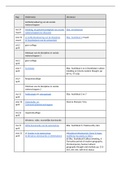Dag Onderwerp Literatuur
Institutionalisering van de sociale
wetenschappen
ma 29 Inleiding: de geloofwaardigheid van sociale Ellar, Introduction
maart wetenschappen ter discussie
woe 31 a) Institutionalisering van de disciplnes Ellar, hoofdstuk 1; Haack
maart b) Geschiedenis van de universiteit
vrij 2 geen college
april
Ontstaan van de disciplines in sociale
wetenschappen 1
ma 5 geen college
april
woe 7 Sociologie Ellar, hoofdstuk 4 en 6 (hoofdstuk 4 alleen
april inleiding en § Early modern thought, pp
89-91, 97-106)
vrij 9 Responsiecollege
april
Ontstaan van de disciplines in sociale
wetenschappen 2
ma 12 Politicologie en antropologie Ellar, hoofdstuk 3 en 7
april
woe 14 Organisatie- en Davis & Marquis; Torp
april Communicatiewetenschappen
vrij 16 responsiecollege
april
Westerse, witte, mannelijke dominantie
ma 19 Witte dominantie van de wetenschap Ellar, hoofdstuk 9; Chakravartty; Hira
april
woe 21 a) Gender in de wetenschap a)Knobloch-Westerwick, Glynn & Huge;
april b) Westerse dominantie en Oriëntalisme Goldberg, Kuvalanka & dikey;
b) Eller, hoofdstuk 8 (alleen inleiding, §
Formative period of modern geography,
5Contemporary human/cultural
geography thought and method; pp. 213-
216, 221-224, 228-241); Alatas
,vrij 23 responsiecollege
april
Waarom de ratio niet altijd beslissend is in
de wetenschap
ma 26 a) Paradigmatische strijd; a) Bryman
april b) serendipiteit b) Pina e Cunha, Clegg & Mendonça
woe 28 a) Pseudo-wetenschap; a) Hansson; Stirling
april b) Linkse wetenschap b) Van der Werfhorst
vrij 30 responsiecollege
april
meivakantie
ma 3
mei
woe 5
mei
vrij 7
mei
Alternatieve vormen van kennis
ma 10 Alternatieve communicatiekanalen in de Bohannon; Frankland & Ray
mei wetenschap
woe 12 Alternatieve kennisbronnen: kunst en Hamid; Ali
mei religie
vrij 15 responsiecollege
mei
Integere wetenschap
ma 17 a) Ethische codes, integriteit en fraude Netherlands Code of Conduct
mei b) De druk van opdrachtgevers vs
activistische wetenschap
woe 19 De neo-liberale universiteit Halffman & Radder; Sauntson & Morrish
mei
vrij 21 responsiecollege
mei
, College introductie 29 maart
Er zou ook westerse-witte dominatie zijn.
Protest voor de dieren eten te geven
Scientific arguments against feeding:
1. fodder taken by the strongest animals
2. fighting and stress in herd
3. early rut: faster population growth
4. digestion switches off from winter condition
5. hay has too much protein
6. feeding makes the animals aid dependent on humans
Maar alsnog gingen ze de dieren voeden. Vanuit
wetenschappelijk oogpunt is het bijvoeren van dieren
onverstandig.
Follow up: meer protesten
De status van wetenschappelijke kennis staat
onderdruk. De status wordt bevraagd.
“Post -truth society”
pre-modern society: given truth
modern society: found truth
Postmodern society: made truth
Post-postmodern society: trust as a marketable
product.
Definition of science
Science is ‘the intellectual and practical activity encompassing the systematic study of the structure
and behavior of the physical and natural world through observation and experiment’
Research is ‘the systematic investigation into a study of materials and sources in order to establish
facts and reach new conclusions.’
Science is the more or less systematic search for knowledge by experts, who react to earlier
knowledge and share their ideas with others
Eller on science
Scientific knowledge inexorably “progress”, that is, each day science has more and better
knowledge that the day before.
scientific knowledge is superior together forms of knowledge because of its “method”; and
scientists are particularly conscious of both
Is social science a science?
pressure = number of inhabitants * agitation / economic resources
Conclusie
premise of this course: science is, despite all its flaws, the best way of gaining insight into the
world
status of science seems to be declining slowly
but still high and it has received a boost by the corona crisis
science is an institutionalised practice
, exact sciences have a higher status, but social science is in some respects fundamentally
different because of the agency of our research subjects
College sociologie woensdag 7 april
Macht is super belangrijk in dit vak.
Ancestors:
Comte de Saint-Simon (1760-1825): de eerste met een sociologische analyse, over de
opkomst van nieuwe klassen in Frankrijk
August Comte (1798- 1857)
Herbert Spencer (1820-1903): Op zoek naar wetmatigheden, naar sociologische wetten
Three founders of contemporary sociology
Karl Marx
Émile Durkheim → “If any individual deserves the title of investor of modern sociology, it is
Durkheim”
o Four foundational texts of Durkheim
The division of labor in society (1893)
The rules of sociological method (1895)
A study in sociology (1897)
The elementary forms of religious life (1912)
4 type zelfmoord:
Egoistic suicide: je bent zo met jezelf bezig dat je zelfmoord pleegt.
Fatalistic suicide: overregulering, heel strikt gevangenisregime.
Anomic suicide: verdwijnen van je normen, zekerheden en vast kades.(joden/duitse)
Altruistic suicide: vanuit cultuur wordt verwacht dat je zelfmoord pleegt. (sekte)
Max Weber
Chicago school
1892 University of Chicago established
William Isaac Thomas
Robert Ezra Park
Human Ecology (Ernest Burgess)
Paul lazarsfeld: een van de eerste die met hele grote surveys werkte en quantitative analyses
maakte.
Biases in Ellar’s overview of institutionalisation
Ibn Khaldun (14th century)
o Als ze goed te voet zijn, kunnen ze numeriek plaatsen
veroveren
Harriet Martineau (1802-1876)
o ‘“If a test of civilization be sought, none can be so sure as
the condition of that half of society over which the other
half has power, from the exercise of the right of the
strongest. Tried by this test, the American civilization
appears to be of a lower order than might have been






